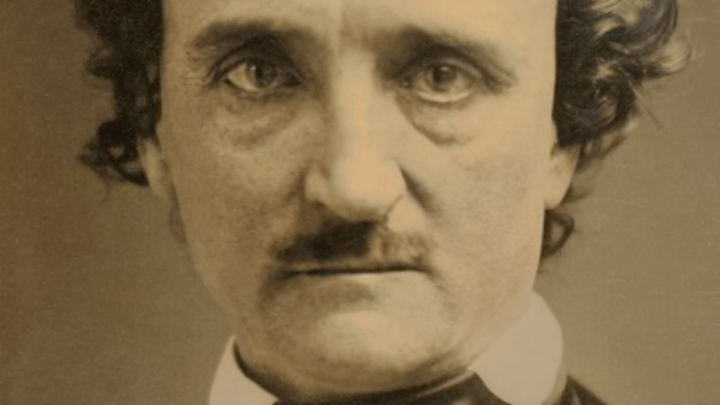There are a lot of Edgar Allan Poe fans out there, and just as many who think he was a hack. In fact, his contemporaries were some of his biggest detractors—and, as a literary critic, he didn’t always think much of them, either. In honor of his birthday, here are five of Poe’s most vitriolic critiques.
1. HENRY WADSWORTH LONGFELLOW
Poe was thoroughly unimpressed with Longfellow and believed that the “Paul Revere's Ride” poet was a plagiarist. Poe called him “the GREAT MOGUL of the Imitators,” saying he was guilty of “the most barbarous class of literary robbery.”
Longfellow had the last word after Poe died, writing this to a colleague: “My works seemed to give him much trouble, first and last, but Mr. Poe is dead and gone, and I am alive and still writing, and that is the end of the matter."
2. NATHANIEL HAWTHORNE
Poe’s disdain for Hawthorne was more professional than personal. He actually loved some of Hawthorne’s work (especially Dr. Heidegger’s Experiment), and even asked him to write for The Stylus, his literary journal. But as a critic, Poe wasn’t one to whitewash things. After reading a review copy of Hawthorne’s Mosses from an Old Manse, Poe denounced his fellow author as “peculiar and not original.”
Hawthorne took Poe’s criticism in stride. On June 17, 1846, he dropped Poe a note, writing,
“I have read your occasional notices of my productions with great interest—not so much because your judgment was, upon the whole, favorable, as because it seemed to be given in earnest. I care for nothing but the truth; and shall always much more readily accept a harsh truth, in regard to my writings, than a sugared falsehood. “I confess, however, that I admire you rather as a writer of tales than as a critic upon them. I might often—and often do—dissent from your opinions in the latter capacity, but could never fail to recognize your force and originality, in the former.”
3. RALPH WALDO EMERSON
Emerson ridiculed Poe's style, calling him a “jingle man.” He even found one of Poe's most celebrated works, “The Raven,” lacking: “I see nothing in it,” he said. But there was no love lost. Poe believed Emerson was a “mystic for mysticism’s sake,” and was scornful of the “so-called poetry of the so-called Transcendentalists.”
4. THOMAS DUNN ENGLISH
Once good friends, English and Poe had a falling out after English made fun of Poe's prowess with the ladies, doubting that he had received love letters from a suitor. Afterward, Poe's reviews of English suddenly took a turn. "No spectacle can be more pitiable than that of a man without the commonest school education busying himself in attempts to instruct mankind on topics of polite literature," he wrote.
5. JAMES FENIMORE COOPER
In 1836, Poe was impressed enough to write to the author of The Last of the Mohicans, requesting a contribution to his literary magazine. In fact, Poe practically begged: "To aid us in this attempt would cost you no effort, as any spare scrap in your portfolio would answer our main purpose and to us your aid would be invaluable."
By 1840, however, it would appear that Poe had changed his mind about Cooper's genius. He emphatically declared Mercedes of Castile, A Romance, "the worst novel ever penned by Mr. Cooper," but he didn't stop there. Poe went for the jugular, claiming that Cooper didn't know how to write believable characters at all: "We did not look for character in it, for that is not Cooper's forte; nor did we expect that his heroine would be aught better than the inanimate thing she is."
